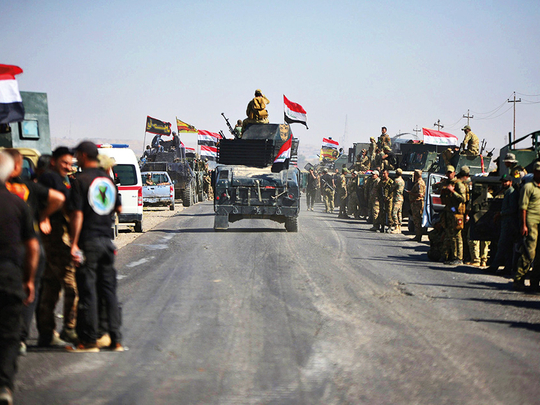
BAGHDAD: Iraqi Prime Minister Haidar Al Abadi faces a dilemma: One the one hand, he has said that he seeks a solution through negotiations. On the other, he has promised there will be no break-up of Iraq. But the Kurds have overwhelmingly voted ‘yes’ in the independence referendum.
Analysts believe Al Abadi’s move to recapture Kirkuk comes down to a number of reasons. In an interview with Gulf News, Mohammad Hineidi, an independent analyst and specialist on Iraq and the Levant, said: “The results of the referendum were seen as an optimal time for the central government in Baghdad to retake Kirkuk. Besides, Al Abadi felt emboldened by regional and international condemnation of the Kurdish referendum. Another reason is the 2018 elections, in which Al Abadi is planning on running. The recapture of Kirkuk from KRG [Kurdistan Regional Government] forces will greatly increase his popularity.”
The importance of Kirkuk lies in its oil riches. Hineidi believes it will be very difficult for the KRG to be an independent republic if it does not control Kirkuk. “The KRG exports its oil from Kirkuk’s oilfields via a pipeline to Turkey, and this makes up the bulk of the KRG’s earnings. The Kurds want to hold on to Kirkuk quite badly, but whether they will be able to withstand Iraqi forces is another story.”
Internationally, countries like Iran and Turkey — with restive Kurdish minorities of their own — are watching the situation with alarm. Al Abadi may believe, with good reason, that they will intervene in support of Iraq against the KRG forces in the event of sustained clashes. “A negotiated settlement favourable to Baghdad is the most likely outcome. In any case, the KRG breaking away from Iraq is extremely unlikely, despite the referendum results. The vote is also non-binding. What [Iraqi Kurdistan President Masoud] Barzani has done with the referendum is provoke Baghdad, while knowing full well that he will not be able to secede, or not anytime soon. I think the outcome will be that the Kurds will continue to be able to produce, and export, oil from the Kirkuk oilfields, but will not control the federal installations that once belonged to the central government.”
Asked about the impact the current standoff will have on the fight against Daesh in Iraq, Hineidi said: “Daesh’s continued presence in Kirkuk province will not provide it with the ability to launch any offensive operations. For the rest of the country, the fight against Daesh is all but over; the group cannot make any recovery in other provinces. However, it will continue to launch suicide and other attacks against security forces across the country, and against civilian targets when it finds the opportunity.”












